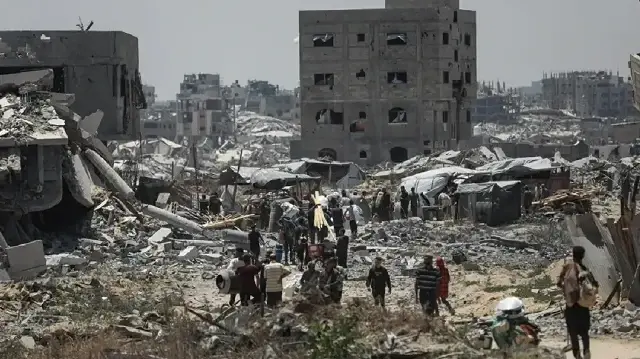Israel's own bomb nearly derailed Gaza ceasefire, US intervention revealed

An explosion in Rafah, initially claimed by Israel as a Hamas attack, was revealed to be caused by an Israeli bulldozer detonating an Israeli bomb. This prompted Israel to plan a massive airstrike, which was reportedly vetoed by the US to preserve the fragile ceasefire, highlighting Washington's crucial role in de-escalation.
A fragile ceasefire in Gaza was nearly broken after an explosion, which Israeli authorities initially blamed on Hamas, was revealed to be caused by an Israeli military bulldozer detonating one of its own bombs. The incident in the southern Gaza city of Rafah led the Israeli Security Cabinet to convene urgently and, according to reports, approve a major retaliatory airstrike involving 100 warplanes. However, high-level US intervention prevented the escalation, with American officials reportedly explaining the true cause of the blast and pressuring Israel to stand down.
US Pressure Forces Israeli Backdown
The sequence of events began with Israeli Prime Minister Benjamin Netanyahu citing security concerns to justify keeping the Rafah border crossing closed, contrary to the ceasefire agreement. Following the explosion, US officials engaged with their Israeli counterparts. Israeli media reported that political authorities ultimately vetoed the planned massive bombardment to avoid angering the Washington administration. Subsequently, Netanyahu quietly reversed his decision on the Rafah crossing, a move that angered his far-right coalition partners.
Israeli Media Acknowledges US Leverage
The reversal was widely analyzed in Israeli press as a sign of American control over the situation. The newspaper Maariv reported on the Security Cabinet's initial decision for a massive airstrike, while a Yedioth Ahronoth analysis stated, "The decision on whether to return to war is now entirely in the hands of the US." The analysis also pointed to heavy pressure from the US and other mediator nations, including Türkiye, Qatar, and Egypt, making certain military strategies "impossible."
Ceasefire Violations and Ongoing Diplomacy
Despite the ceasefire, tensions remain high. Netanyahu himself admitted to a violation, stating that Israeli forces used 153 tons of bombs on targets across Gaza during the truce, claiming two soldiers were killed. According to the Gaza government's media office, Israeli attacks in the 10 days since the ceasefire was established have killed 97 Palestinians and wounded 230. Concurrently, US diplomatic efforts intensified with a delegation including Vice President JD Vance, Special Representative Steve Witkoff, and Jared Kushner arriving in Tel Aviv for talks with Netanyahu before heading to Cairo.
Hamas Delegation Engages in Cairo Talks
Simultaneously, a Hamas delegation led by Dr. Khalil al-Hayya arrived in the Egyptian capital. The delegation is expected to meet with other Palestinian factions and the US officials. In a prior statement, Witkoff noted he had previously met with al-Hayya in Doha, saying, "I offered my condolences for the loss of his son in the attack... I told him, 'We are both members of the same club: the club of fathers who have buried their sons.'"
Reklam yükleniyor...
Reklam yükleniyor...







Comments you share on our site are a valuable resource for other users. Please be respectful of different opinions and other users. Avoid using rude, aggressive, derogatory, or discriminatory language.